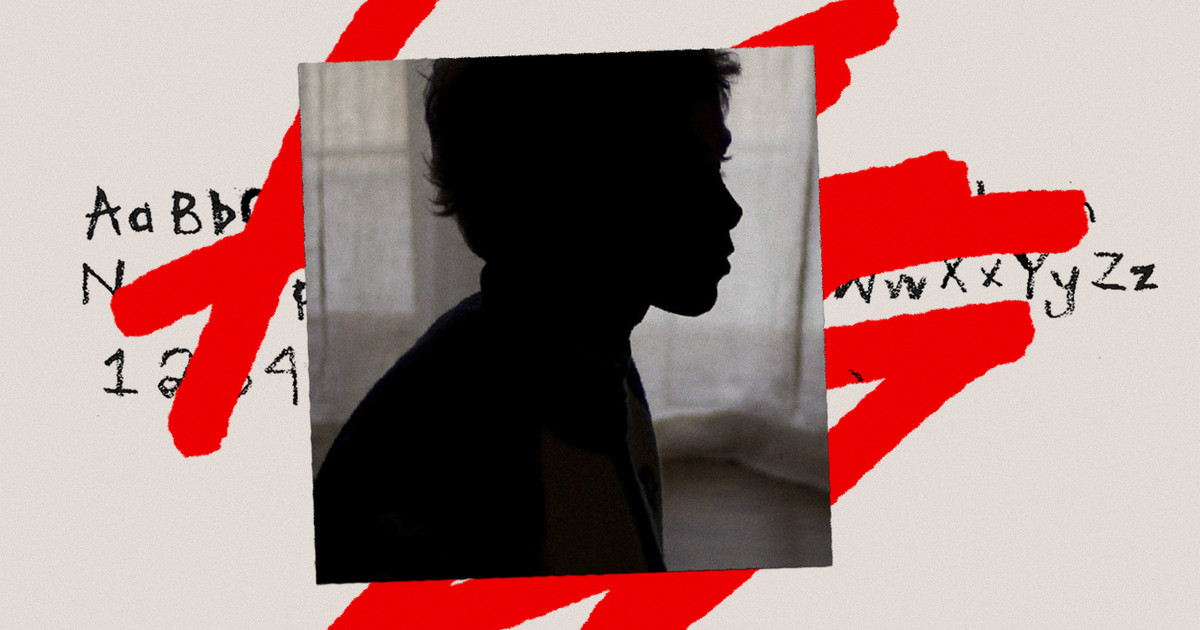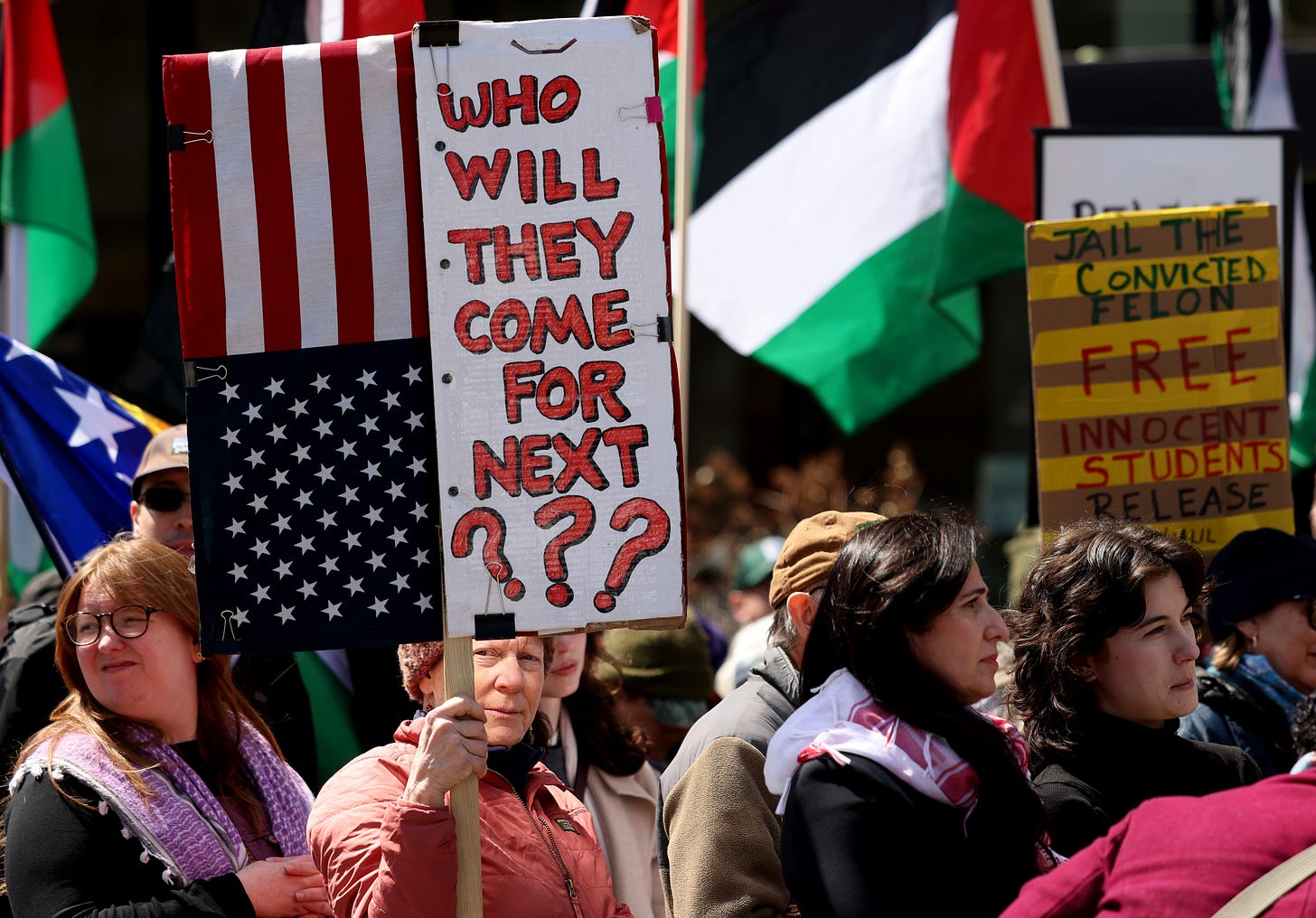
The Trump Administration’s War on Children
April 23, 2025
Fentanyl Pipeline: How a Chinese Prison Helped Fuel a Deadly Drug Crisis in the United States
April 23, 2025ON MARCH 25, RÜMEYSA ÖZTÜRK, a Turkish national working on her Ph.D. at Tufts University, was snatched off the street near her apartment in Somerville, Massachusetts, by masked, plainclothes federal immigrant agents. She was placed under arrest, handcuffed, chained at the waist, put in ankle shackles, and shipped off to a series of immigration detention facilities before ending up at one in Louisiana, where she remains.
It’s unclear what if any process led to Öztürk’s arrest, but there are no good explanations. One possibility is that the decision to arrest and detain her was made in haste, before the White House, the State Department, and the Department of Homeland Security could agree on a legal rationale. Now, as Öztürk languishes in detention, 1,500 miles from where she was dragged off the street, the government has scrambled to legitimize its actions—and failed.
The other, even more disturbing possibility is that the government intentionally arrested and detained Öztürk as a challenge to the courts and the rule of law, just to see whether there remain any bounds at all on its ability to use force against those it deems to be its enemies.
Öztürk’s student visa was terminated a few days before she was scooped up, but no one bothered to convey this to her. A senior spokesperson for the Department of Homeland Security claimed that DHS and Immigration and Customs Enforcement (ICE) investigations found that Öztürk had “engaged in activities in support of Hamas, a foreign terrorist organization that relishes the killing of Americans.”
That was a deliberate and knowing lie. According to a report last week in the Washington Post, the State Department had determined several days before Öztürk’s arrest that the Trump administration “had not produced any evidence showing that she engaged in antisemitic activities or made public statements supporting a terrorist organization,” according to an internal memo described to the paper.
Öztürk, a Turkish citizen who entered the United States on an F-1 student visa, is perhaps the second best–known target of the Trump administration’s crackdown on international students, after Mahmoud Khalil, a grad student at Columbia who led pro-Palestinian protests. On March 8, federal agents arrested Khalil in front of his wife, a U.S. citizen then eight months pregnant, and took him to a different detention facility in Louisiana. (On Monday, he missed the birth of his child, a healthy baby boy.)
Like Khalil, Öztürk has not been charged with any crime or even accused of breaking any law. Her sole offense appears to be that, in March 2024, she was one of four co-authors of an op-ed in the student newspaper criticizing the university’s response to the carnage in Gaza. The piece appears to have come to the attention of the website Canary Mission, which targets pro-Palestinian students as part of its efforts to silence criticism of Israel. In February, it published Öztürk’s photo and other identifying information, claiming she had “engaged in anti-Israel activism”; the government took it from there.
A federal judge in Massachusetts blocked Öztürk’s deportation, although she remains in federal custody based on absolutely no evidence. Trump, who has benefited from the protections of due process more than perhaps anyone else in American history, doesn’t see why it should be afforded to anyone else.
Secretary of State Marco Rubio, asked about Öztürk’s arrest and detention, admitted his personal involvement in her case, telling reporters: “We do it every day. Every time I find one of these lunatics, I take away their visas.”
Rubio has been finding lots of these lunatics.
Between January 20 and of April 22, according to a tracker maintained by Inside Higher Ed, the State Department changed the legal status of more than 1,700 international students. It has revoked student visas for minor, years-old offenses including traffic tickets or for no apparent reason at all. “In the vast majority of visa revocations,” the Guardian reported, “colleges say there is no indication that affected students had a role in protests.” Not that it would be grounds for removal if they had.
Öztürk’s case is a template of sorts for Trump’s new, relaxed standard for cracking down on constitutionally protected speech. But it’s also notable for another reason—the absolutely astonishing amount of lying it has occasioned.
IN HIS COMMENTS ON Öztürk’s arrest, Rubio alleged that the students now being expelled came to the United States “not just to study but to participate in movements that vandalize universities, harass students, take over buildings, and cause chaos.”
Yet there is no evidence that Öztürk did any of these things, or even that she played a significant role in last year’s protests at Tufts. The only actual illegal actions in her case are those being committed by the government, starting with its defiance of a court order issued six hours after Öztürk’s arrest that prohibited her removal from Massachusetts without advance notice.
“Rümeysa Öztürk’s experience is shocking, cruel, and unconstitutional,” said her lawyer, Mahsa Khanbabai. “For nearly 24 hours, we could not locate her, and despite a court order to prevent the government from taking her out of Massachusetts, we finally learned the Trump administration had shipped her to Louisiana.”
From the start, conservative commentators have rushed to manufacture justifications for Öztürk’s horrific treatment. On the day after her abduction, Newsmax host Rob Schmitt declared that Öztürk was “evidently a rabid pro-Hamas protester.” He praised the Trump administration for “getting this cancer slowly out of our country.”
Newsmax host Chris Plante, not to be outdone, called Öztürk a “pro-Hamas agitator” whose arrest has “garnered sympathy from our Hamas-loving media.” He went on the claim that Öztürk and Khalil “lied on their applications for their student visas when they’re asked about organizations they’re affiliated with.” (Presumably, they didn’t check the box that says “I’m with Hamas.”)
Over at Fox News, host Howard Kurtz seemed genuinely troubled by the video of Öztürk’s abduction, calling it “pretty chilling” and “kind of creepy” and noting “the agency has not provided many details of what this woman allegedly did.” To which frequent guest and Washington Times correspondent Susan Ferrechio replied: “Well, she did write an op-ed in support of Hamas.” No one bothered to point out that Öztürk never mentioned Hamas.
Others on the right responded with similar pique. Brianna Lyman, a correspondent for the Federalist, accused the left of “weaponizing the First Amendment” to defend foreigners who “openly promote terrorism and anti-American values.” Jacob Falach, a writer for the Daily Wire, praised Öztürk’s arrest as “a move in the right direction,” lamenting only that she is “just one of countless students across the country who share a radical ideology” who ought to be expelled. (Falach’s article ran under an image of an unidentified person—but not Öztürk—wearing a keffiyeh over their head and face.)
And Joel Griffith, a former Heritage Foundation research fellow, called it “disturbing” that “somehow Rumeysa Ozturk remained in the USA so long.”
So who is Rümeysa Öztürk and why is she so dangerous?
ÖZTÜRK, THIRTY, IS A FORMER Fulbright Scholar and an expert in childhood development who previously worked as a research assistant at Boston University and earned a master’s degree from Columbia University’s Teachers College.
Reem Alattas, her friend and fellow Tufts international student, described Öztürk as “sweet, kind, and gentle,” according to an article in Middle East Eye. Alattas recalled the surprise birthday party Öztürk threw for her a few years ago. Being an international student “can be a very lonely journey, but during that time you meet some people, and they make it a little bit easier for you,” Alattas said. “For me, Rumeysa was one of those people because she’s a genuine person.”
Öztürk’s former teacher, Reyyan Bilge, a Tufts alumna, said Öztürk is “one of the most exceptional students that I have had. She’s remarkable, really ambitious and hardworking. She’s a nice, quiet, and peaceful person who cares about others. When you talk to her, you see she’s not a threat to anyone. She’s not aggressive in any way.” In fact, Bilge said, she had never heard Öztürk swear.
And an unnamed faculty member said Öztürk “goes above and beyond to help create an inspiring and inclusive learning environment where students feel valued and empowered. Rumeysa’s motivation, patience, empathy, and ability to engage with students is inspiring.”
Öztürk’s lawyers say that, since being taken into custody, she has suffered at least six asthma attacks. After the first attack, she was taken to a medical center, where she said a nurse removed her hijab without permission. After the third, she did not go to the medical center despite being “in pain and very scared.” She has described the conditions of her confinement as “very unsanitary, unsafe, and inhumane,” saying she is one of twenty-four women being held in a cell with a capacity of fourteen.
EARLIER THIS MONTH, A COALITION of 27 Jewish organizations and synagogues from across the United States filed an amicus brief stating that Öztürk’s arrest and detention for her protected speech “violate the most basic constitutional rights.” It added that the Trump administration “appears to be exploiting Jewish Americans’ legitimate concerns about antisemitism as pretext for undermining core pillars of American democracy, the rule of law, and the fundamental rights of free speech and academic debate on which this nation was built.”
On April 14, at a hearing in a federal courthouse in Burlington, Vermont, Öztürk’s lawyers argued that she was unconstitutionally arrested and detained, saying the government had numerous opportunities to present evidence opposing her release but had failed to do so.
Michael Drescher, acting U.S. attorney for the District of Vermont, delivered an explanation of the government’s position that might have sent Kafka reaching for his pen. He reportedly said Öztürk “is in custody because she is in removal proceedings. She was taken into custody because of her absence of status.” He added: “The fact of her detention is inextricably connected to the fact that she is in removal proceedings.”
Federal Judge William Kenneth Sessions III said he would take the matter under advisement, agreeing that the case was complex but stating that his court had a duty to determine if Öztürk’s constitutional liberties were violated. Drescher said he doesn’t think Sessions has the authority to order Öztürk’s release. Sessions replied by saying that if he ordered her release and the government refused, that would constitute “a constitutional crisis.”
Last Friday, Sessions set dates for further proceedings, including two hearings in May, and ordered the government to return Öztürk to Vermont by May 1 so she could attend them, saying her arrest and detention have “raised significant constitutional concerns.” He gave the government four days to appeal, which it did Tuesday night.
In a separate proceeding on April 16, a federal immigration judge denied Öztürk’s request to be released on bond as her immigration case proceeds. He determined that she is both a flight risk and a danger to the community. Öztürk’s attorneys argue in a brief filed with the Vermont federal district court that the immigration judge’s decision was a based solely on the State Department memo that “points to no conduct of Ms. Öztürk’s except her co-authorship of an op-ed.”
That is why Rümeysa Öztürk remains locked up. Any other explanation is a lie.
Great Job Bill Lueders & the Team @ The Bulwark Source link for sharing this story.





